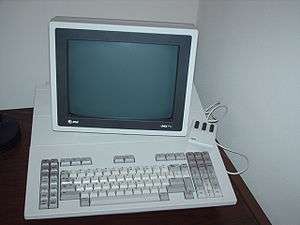AT&T Unix PC
 AT&T Unix PC | |
| Manufacturer | Convergent Technologies |
|---|---|
| Type | Professional Computer |
| Release date | 1985 |
| Media | 5¼-inch floppy disks, optional quarter-inch cartridge tapes |
| Operating system | AT&T Unix v3.51 |
| CPU | Motorola MC68010 with custom Memory management unit clocked at 10Mhz |
| Memory | 512KB to 4MB RAM |
| Storage | Optional 10MB, 20MB, 40MB, and 67MB hard drives |
| Display | 720x348 pixel resolution |
| Input | Keyboard, 3-button Mouse |
The 3B1 (also known as the PC7300, or Unix PC) was a Unix workstation computer originally developed by Convergent Technologies (later acquired by Unisys), and marketed by AT&T in the mid- to late-1980s. Despite the name, the 3B1 had little in common with AT&T's other 3B-series computers.
Hardware configuration
- 10 MHz Motorola MC68010 (16 bit external bus, 32 bit internal) with custom, discrete MMU
- Internal MFM hard drive, originally 5 MB, later models with up to 67 MB
- At least 512K RAM on main board, expandable via expansion cards
- 3 expansion slots
- Monochrome green phosphor 10-inch (250 mm) monitor
- Internal 300/1200 bit/s modem
PC7300
The initial PC7300 model offered a modest 512 KiB of memory and a small, low performance 5 MB hard drive. This model, although progressive in offering a Unix system for desktop office operation, was underpowered and produced considerable fan and drive bearing noise even when idling. The modern-looking "wedge" design was innovative, and in fact the machine gained notoriety appearing in many movies as the token "computer."
AT&T 3B1
A later enhanced model was renamed "3B1". The cover was redesigned to accommodate a full-height 67 MB hard drive. This cover change added a 'hump' to the case, expanded onboard memory to 1 or 2 MB, as well as added a better power supply.
Operating system
The operating system is based on Unix System V Release 2, with extensions from 4.1 and 4.2 BSD, System V Release 3 and Convergent Technologies. The last release was 3.51.
Programming languages
- SMC BASIC
- RM COBOL
- RM FORTRAN
- LPI FORTRAN
- LPI Pascal (programming language)
- LPI C (programming language)
- SVS FORTRAN
- SVS Pascal
- AT&T BASIC
- GNU C++
- LISP
Application software
- SMART System (Office Suite)
- Informix (DBM)
- Oracle (DBM)
- Multiplan (Spreadsheet)
Word processors
- Microsoft Word
- AT&T Word Processor
- Crystalwriter
- WordStar 2000
- Samna Word
- WordMarc
- SMART Word Processor
Games
Utility
The Store
The Store is a public domain software repository which was available for all 3B1 users.[4]
Expansion Cards
- DOS-73 8086 co-processor card running MS-DOS, which could be fitted with an 8087 math co-processor chip. This board was designed and built for AT&T by Alloy Computer Products of Framingham MA.
- RAM card could be added using 1 or 2 MB RAM cards (up to a maximum of 4 MB)
- EIA/RAM combo cards contained extra RAM and two RS-232 serial ports.
- Dual EIA port card
- StarLAN 1Mbit/s LAN card
- Ethernet 10 Mbit/s LAN card
- VoicePower card allowed for the capture and digital recording of voice conversations.
- Tape drive card provided interface for 23 MB MFM Tape Cartridge Drive.
- Expansion chassis card was hard-wired to Expansion Chassis (with five added slots)
Networking
- StarLAN – 1 MB/s local area network typically used in star format.
See also
External links
- AT&T Leapfrogs IBM WIth the Unix PC., InfoWorld, April 15, 1985, pp. 15–17
- The AT&T Unix PC, article from BYTE magazine Volume 10 Number 05: Multiprocessing (May 1985), pp. 98–106
- comp.sys.3b1 FAQ
- AT&T 3B1/7300 (UNIX PC) Information
- AT&T UNIX PC at old-computers.com
- http://bitsavers.trailing-edge.com/pdf/att/3b1/
- http://www.unixpc.org